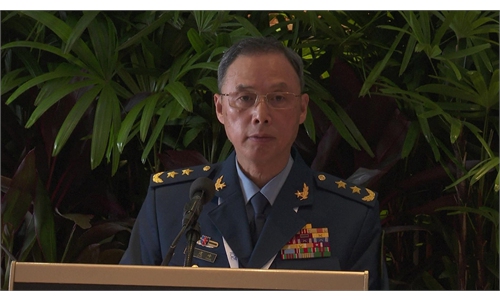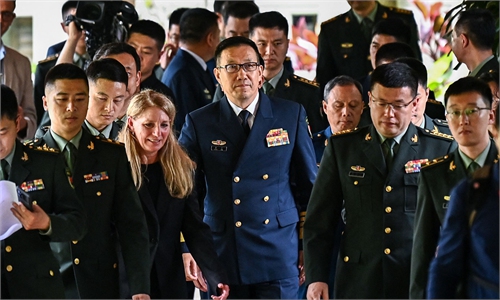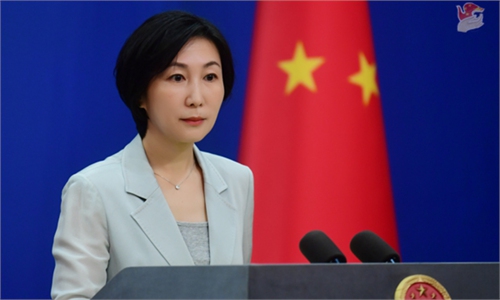
US Taiwan arms sales Illustration: Liu Rui/GT
The US is trying to challenge United Nations General Assembly (UNGA) Resolution 2758. Although this is nothing but a fool's dream, the US seems to be getting too immersed in this dream. According to Taiwan media reports, a group of 27 US defense contractors arrived in the Taiwan island on Monday and will attend the "Taiwan-US Defense Industry Forum" on Thursday. Former US Marine Corps Forces Pacific commander Steven Rudder will attend the opening ceremony.
According to reports, this is the first visit by representatives of prominent American arms suppliers, such as Lockheed Martin and Raytheon, since Lai Ching-te took office as leader of the Taiwan region on May 20. Lockheed Martin and Raytheon were included in China's list of targets of countermeasures, which the Chinese Ministry of Foreign Affairs announced on May 22.
American arms suppliers visiting the Taiwan region in groups is nothing more than targeting the money bags of Taiwan. For US politicians, hyping up the situation in the Taiwan Straits is just to shape a tough image toward Chinese mainland and gain political capital. Despite China's strong dissatisfaction with and firm opposition to the US' meddling in the Taiwan question and blatant interference in China's internal affairs, the US has always been double-dealing on the Taiwan question, not only ignoring China's opposition but also questioning and challenging UNGA Resolution 2758.
Mark Lambert, US State Department China Coordinator, stated at a recent think tank event that UNGA Resolution 2758 "does not reflect a consensus for China's one-China principle." Some US officials also indicated that UNGA Resolution 2758 "does not preclude Taiwan's meaningful participation in the United Nations system and other multilateral forums." These arguments distort the facts, manipulate history and trample on the basic principles of international law and international relations.
The one-China principle is formed by history. Since the Qing government established Taiwan prefecture in 1684, which was under Fujian Province, it has been 340 years. In 1971, the 26th session of the UNGA adopted Resolution 2758, which recognizes the representatives of the government of the People's Republic of China as the only legitimate representatives of China. The Taiwan region is part of China. The 26th session of the UNGA also rejected proposals involving "two Chinas" and "dual representation rights" put forward by countries such as the US, further affirming the one-China principle. UNGA Resolution 2758 leaves no room for "two Chinas" or "one China, one Taiwan."
On January 1, 1979, China and the US established diplomatic relations, based on the three principles that the US had severed "diplomatic relations," abrogated the "mutual defense treaty" with the Taiwan authorities, and withdrawn US military forces from Taiwan as a precondition. The signing of the three joint communiqués between China and the US is vividly remembered. The US declared to the world that it recognized the government of the People's Republic of China as the only legitimate government of China, acknowledged that there is only one China, and the Taiwan region is part of China. Presidents such as Bill Clinton have also publicly declared and reiterated that the United States does not support "Taiwan independence," does not support "one China, one Taiwan" or "two Chinas," and does not support Taiwan region representation in international organizations where statehood is a requirement.
In recent years, Washington has tried to challenge the international consensus on the one-China principle. In May 2020, then-Chairman of the Senate Foreign Relations Committee Bob Menendez and others urged member countries to support the Taiwan region's entry into the WHO under the pretext that "diseases know no borders." In October 2021, then-US Deputy Assistant Secretary of State for Asia-Pacific Affairs Rick Waters expressed support for "Taiwan's meaningful participation" in the UN system. The US is attempting to hollow out and dilute the one-China principle.
The US, in order to contain the rapidly developing China, not only uses trade wars, technology wars and other means but also plays the "Taiwan card." As a major country and a permanent member of the UN Security Council, the US should lead by example in complying with resolutions passed by the UNGA.
Chinese Defense Minister Dong Jun issued a warning at the recently concluded Shangri-La Dialogue in Singapore, saying, "Anyone who dares to separate Taiwan from China will only end up in self-destruction." The US has been ignoring China's warnings and continues to provoke China, essentially fueling "Taiwan independence" activities. The US' sinister intentions are leading the Taiwan region into a dangerous situation.



